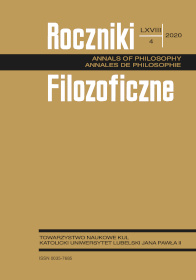
We kindly inform you that, as long as the subject affiliation of our 300.000+ articles is in progress, you might get unsufficient or no results on your third level or second level search. In this case, please broaden your search criteria.


Taking the standpoint of monotonicity reasoning, this paper provides a systematic way of looking at the inference pattern mou in the Mohist text. We have taken a logical, as well as a linguistic perspective, emphasizing features of classical Chinese, the role of context, and making use of any possible clues that we can find from the old text. By applying monotonicity rules we provide a uniform account of why shi er ran examples are valid inferences, and shi er buran examples are counter-examples.
More...
My goal of this article is to analyze the argumentation lines for the correctness of standard logic. I also formulate a few critical and comparative remarks. I focus on four the most coherent and complete argumentations which try to justify the distinguished position of classical logic. There are the following argumentations: Willard van O. Quine’s pragmatic-methodological argumentation, Jan Woleński’s philosophical-metalogical argumentation, Stanisław Kiczuk’s ontological-semantic argumentation, argumentation based on metalogic. In my opinion, the thesis concerning the correctness of classical logic is rationally justified by these argumentations. The problem remains whether the analyzed standard logic is the only proper logic.
More...
In the paper, we try to find a new, intuitive solution to the Fitch paradox. We claim that traditional expression of Knowability Principle (p → ◊Kp) is based on erroneous understanding of knowability as de dicto modality. Instead, we propose to understand knowability as de re modality. In the paper we present the minimal logic of knowability in which Knowability Principle is valid, but Fitch Paradox does not hold anymore. We characterize the logic semantically as well as by an axiomatic and tableaux procedure approach.
More...
Analyzing situations where information is partial, incomplete or contradictory has created a demand for quantitative belief measures that are weaker than classic probability theory. In this paper, we compare two frameworks that have been proposed for this task, Dempster-Shafer theory and non-standard probability theory based on Belnap-Dunn logic. We show the two frameworks to assume orthogonal perspectives on informational shortcomings, but also provide a partial correspondence result. Lastly, we also compare various dynamical rules of the two frameworks, all seen as generalizations of classic Bayes’ conditiong.
More...
In the article we present an extension of the minimal, normal positional logic, i.e., the logic with realization operator MR. Positional logic is a philosophical logic that makes it possible to relate sentences to contexts that can be understood in many ways. We enrich the basic language of minimal positional logic with additional expressions built with predicates and positional constants. We also accept expressions built with the realization operator and many positions, like: Ra1,K,an(A) Thanks to this, we increased the expressivity of minimal positional logic. In the article we point to many examples of the fact that, thanks to this small change, complex theories based on the proposed extension can be created. As a theory of proof for our logic, we assume tableau methods, showing soundness and completeness theorems. At the end, however, we show that the logic studied here is only a language extension of the MR: all theorems of the extension have their equivalents in pure MR theorems. However, theories built upon the proposed extension can express much more than theories built upon pure MR.
More...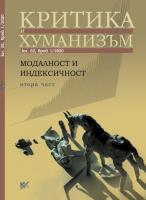
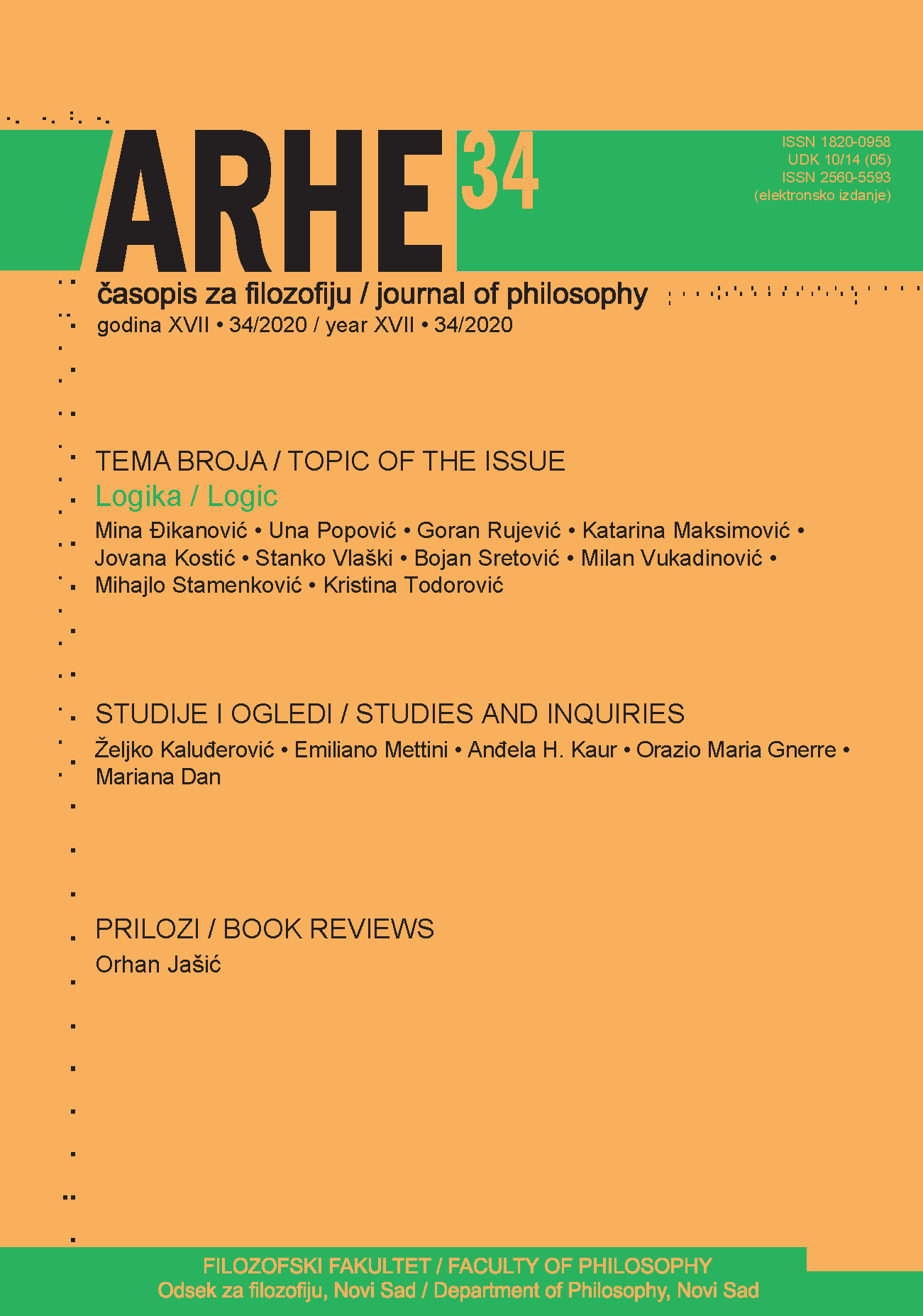
In this paper, we follow Gödel’s remarks on an envisioned theory of concepts to determine which properties should a logical basis of such a theory have. The discussion is organized around the question of suitability of the classical predicate calculus for this role. Some reasons to think that classical logic is not an appropriate basis for the theory of concepts, will be presented. We consider, based on these reasons, which alternative logical system could fare better as a logical foundation of, in Gödel’s opinion, the most important theory in logic yet to be developed. This paper should, in particular, motivate the study of partial predicates in a certain system of three-valued logic, as a promising starting point for the foundation of the theory of concepts.
More...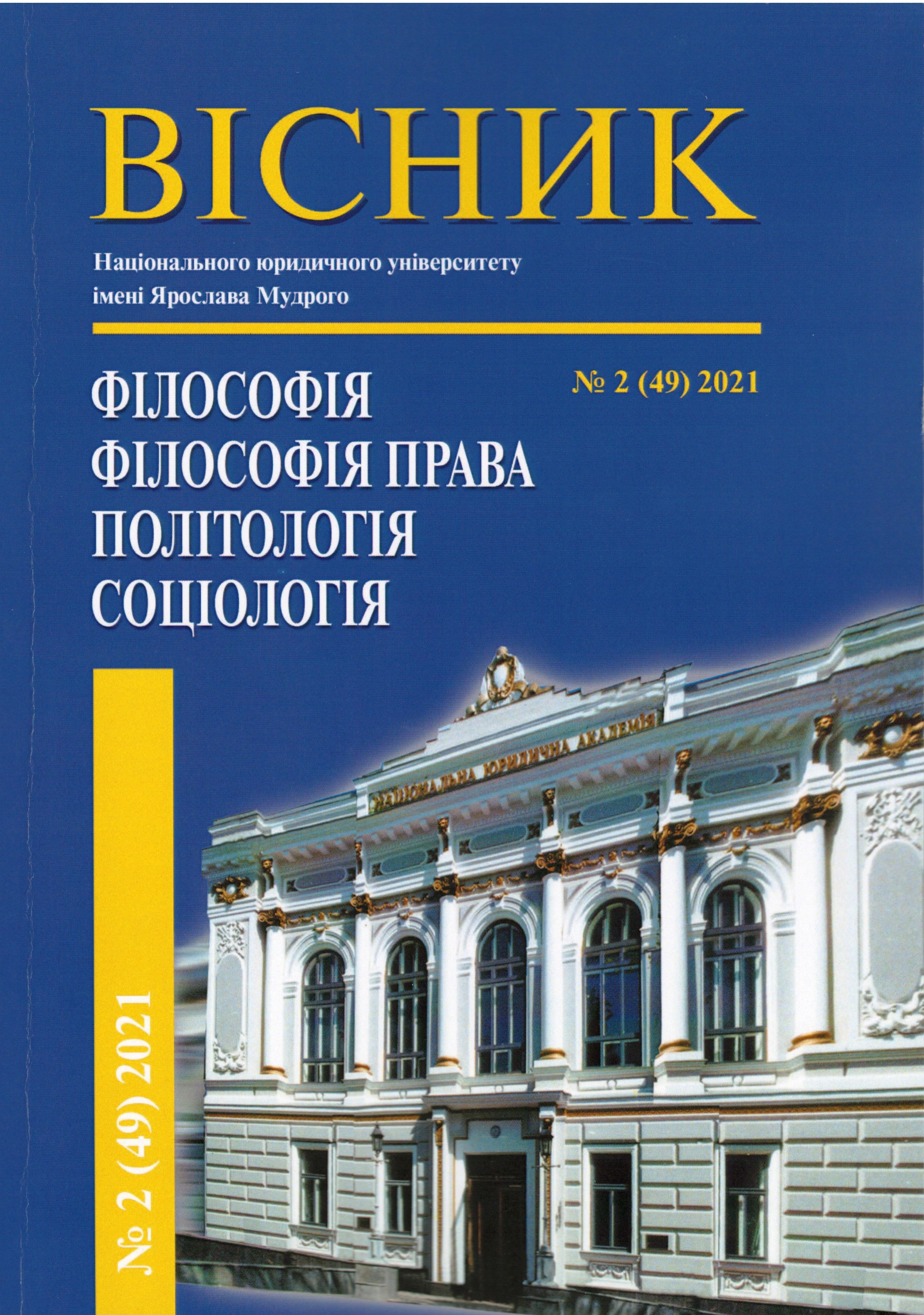
Problem setting. One of the complex and controversial theoretical issues is the meteorological division and construction of the taxonomy of parts. After all, humanitarian and social subjects, due to their own specifics related to their existence, need other grounds for distribution. Thus, the study of the taxonomy of parts and its logical principles in meteorology will help to deepen the understanding of the specifics of the humanities and social sciences and the development of the logical basis of the methodology of the humanities. Recent research and publications analysis. Analysis of sources of origin, modern theoretical works on meteorology indicate unresolved issues regarding the taxonomy of parts, the possibility of involving mathematical set theory, doubts about the stability of the principles of part ratio, the problem of identity and more.Paper objective. The purpose of the study is to consider the problem of division of the whole into parts and the principles of construction of the taxonomy of parts, the reasons for their stability or doubt in meteorology.Paper main body. Mereological structure consists of a whole and parts. Parts can be constituent elements, components, ingredients, portions, aspects, parties, members, etc.Parts can be considered in the abstract (as a part in relation to any whole) or in relation(taking into account the function, ie as a component of the whole). Parts can be concrete or abstract. When analyzing the types of parts, there may be a problem of identity. The order of the parts, their distribution and relationship are determined by reflexivity, transitivity and antisymmetry. All three principles – reflexivity, transitivity and antisymmetry, together with taxonomy appear as the theoretical basis of classical meteorology. Conversely, in nonclassical meteorology, arguments are developed regarding doubts about the stability of these principles. Additional principles are the principles of composition and decomposition.Extensional mereology demonstrates its limitations in relation to living objects.Conclusions of the research. The article analyzes the types of parts, the principles of their relationship, doubts about the stability of these principles and their assessment of the identity of parts and the whole. In our opinion, this opens the possibility of further distinguishing between extensional mereology and meteorological approach in hermeneutic logic, which determines the further success of building an authentic logic of humanitarian and social cognition.
More...
Problem setting. Manipulations are the main thing in «black rhetoric». Nowadays, it is not difficult to influence with the help of words, different techniques can be used, but they all act as a forced verbal influence on the listener. All of them are formulated and sound based on the power of words. However, where the coercion of submission to another’s will is disguised and hidden, there is always contempt and speculation. Therefore, it is no coincidence that most experts raise the question of the moral side of the use of black rhetoric. However, it is fair to say that «black rhetoric» does not mean that it is «forbidden rhetoric.» Most likely – this is the reverse side of the classic rules of the communicative process. These are two reverse sides of the same coin: on the one hand, argumentation and logic are clearly presented. On the other hand – rhetoric as a method of securing beliefs.It is believed that black rhetoric is constructive under certain conditions.Paper objective. An article devoted to the study of the problems of the application of manipulations with «black rhetoric», coverage of the technology of black rhetoric and methods of resistance to the means and technical manipulative influence on consciousness.The aim of the study is to reveal the techniques of «black rhetoric» and find ways to overcome several methods of manipulating consciousness.Paper main body. According to K. Bredemayer, «black rhetoric» is the manipulation of a complex of rhetorical, dialectical, polemical and rabid methods in order to direct the conversation in the desired direction and lead the opponent or the audience to the desired conclusion and result for the manipulator.«Black rhetoric» and logic are interconnected, they are united not only by a common process of proof, but also by the fact that each of the sciences is based on thinking, in fact,the main type of rhetoric is verbal thinking, and the most important argument is manipulation.Verbal thinking – thinking that operates with fixed concepts in words, thoughts,conclusions, analyzes and summarizes, builds hypotheses and theory. It takes place informs that are constant in the language, ie carried out in the processes of internal or («thinking aloud») external language. Communication through verbal means is nothing more than the use of a living word in the transmission of information. But in addition to language, speech, there are other means of communication. People exchange information through gestures, facial expressions, looks, postures, body movements, which are callednon-verbal (non-verbal) means of communication.Nonverbal communication is a system of nonverbal cues that serve as a means ofexchanging information between people. There is no consensus on the composition of nonverbal components of communication, their classification is based on different criteria.Thus, the communicative nonverbal components of communication are praxodic, kinetic,toxic and proxemic means.«Black rhetoric» uses primarily verbal manipulations. Manipulation is the covert control of people and their behavior. The peculiarity of all manipulative language techniques is that the speaker does not directly state his true purpose. The interlocutor seems to come to the conclusion that the manipulator needs.Language manipulation can be found in almost all spheres of human life: in advertising,trade, politics, education, psychotherapy, jurisprudence, literature, family communication and more. In addition to language manipulation, there is also psychological manipulation,which has the following characteristics: the attitude of the manipulator to the objects of manipulation as a means to achieve one’s own goal; the desire to gain a unilateral advantage; the latent nature of the influence (both the fact of influence and its direction);use of psychological vulnerability of the person.The analysis of the listed manipulative techniques of «black rhetoric» shows the absence of logical methods of proof and refutation. Psychological factors, emotional influences,suggestive possibilities are emphasized – thinking avoids logical principles of proof and refutation.Conclusions of the research. Strategies such as: take the initiative in the conversation to prevent manipulation; do not allow a skillful interlocutor-manipulator to disturb the normal course of your thoughts in his favor, because black rhetoric seeks to use linguistic means, the purpose of which is the ability to argue and discuss, emphasize and propagate so that the speaker always wins, despite the erroneous judgments.To effectively counteract «black rhetoric», psychological influence through critical thinking and reflection should be avoided; emphasize the logical means of discussion;analyze the information by comparing the proposed facts to be verified.Mastering the logical methods of introducing a discussion allows you to overcome the dangerous effects of «black rhetoric», to resist suggestions. Information security is thus achieved by mastering logical knowledge and skills of logical proof and refutation.
More...
Problem setting. Today new generation of future military professionals must be prepared for professional activity and life in the ever-changing conditions of military affairs. Military activity is a specific type of activity. Therefore, higher military education should become school of high culture of thinking of future military specialists. The formation of a logical culture of the future military specialist and a holistic personality is inconceivable without the formation of professional thinking. One of the main shortcomings in the training of cadets is the problem of solving new technical problems.Recent research and publications analysis. On the basis of theoretical analysis of scientific sources and expert assessment of the significance of components of the creative activity of military specialists professional thinking, the criteria for the development of each component and their indicators have been defined. This problem is considered by Zavalishin, Teplov, Yagupov, technical thinking (Kudryavtsev, Kulyutkin, Reshetnikov) and othes.Paper objective. In the research the theoretical basis and experimental study of peculiarities of the development of the logical component of future military specialists’ professional thinking in the process of professional training in a higher education institution have been carried out.Paper main body. On the basis of theoretical analysis it has been determined that logical thinking is an important component of the professional skill of a specialist, which ensures the successful accomplishment of professional tasks, the adoption of optimal solutions in a certain area of activity, and it is the embodiment of the professional competences of the individual and the condition for his or her professional development.The paper deals with the problem of logical thinking as an important component of training military specialists in psychological and pedagogical sciences. The analysis of thinking as a psychological cognitive process, in scientific works of foreign and native scientists,considering the regularities of the human psyche functioning in extreme situations, has carried out, in order to improve the moral and psychological support of the personnel. The model of future military specialists training for the development of primary school pupils’ logical skills has been developed and tried out. It includes such units as: purposeful (socialcontrol, aim, tasks); methodological (approaches, principles, interaction subjects); content and activity (content, forms, means, methods, technologies); assessment and resultative (criteria, rates, levels, result). Forms, methods and means of educational process according to the future military specialists training for the development of cadets logical skills have been improved. This notion has historical character and complex structure: levels of formal logic and dialectics. The pedagogical ways of formation of culture of thinking of students are also given. The transition in the educational dialogue from oral to written, from the external to the internal dialogue, and vice versa, ensures the development of thinking interlocutors in the process of solving educational problems. Educational dialogue is not only an exchange of remarks between its participants, but it is their social interaction,communication, which activates their mental, emotional, sensuous activity. The characteristics of professional thinking of the organizers of future military specialists,which need to be developed to achieve professionalism in the professional military activity,have been considered.Conclusions of the research. Practical meaning of the obtained results lies in the development and implementation into the educational process of establishments of higher education the diagnostics methodology of the future teachers’ readiness levels for the formation of military specialists logical skills. The number of academic hours has been increased to study the methodology of solving tasks in logic. The characteristics of professional thinking of the cadet, which need to be developed to achieve professionalism in the professional military activity, have been considered.
More...
Constantin Rădulescu-Motru’s Lessons on Logic offer an original point of view on the status of logic, despite being presented in a series of lectures held at the Faculty of Philosophy and Letters of the University of Bucharest in 1914–1915. Unlike Titu Maiorescu and the other Maiorescians, Rădulescu-Motru conceives logic as a science that has its sources in experience; it does not issue a priori principles that guide the sciences, but limits itself to „the inquiry into the certainty of science data”.
More...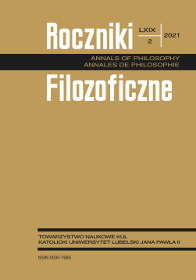
It is common for different types of mathematical structuralism that the conjunction of two statements ( a) mathematics is science about structures and b) mathematics is deductive science) is true, Distinct arguments for this two features of mathematics are exanimated therefore the main concepts (structurality and deductivity) are understood differently, the results are various types of structuralism. We claim that it is possible to establish the way of understood of this two concepts in witch they are equivalent. We argue that can interpret mathematical structuralism as equivalence: a) mathematics is science about structures if and only, if b) mathematics is deductive science
More...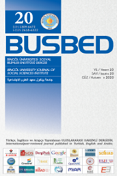
In this study it will be focused on if non-branching rule, which takes part in the truth tree method of the modern logic, has a priority to branching rule. That is, firstly it will be studied whether branching can be determined as a rule in terms of development reason of the truth tree method. In this way this topic will be investigated with regards to the results of analysed symbolic expressions and developing of the truth tree method. It will be stated that the priority between both rules will not be defined regarding the results by means of samples. It will also be emphasised on that there is a priority of non-branching rule to branching rule within the context of developing truth tree method. As a conclusion, it will be revealed that to give priority to non-branching should be determined as a rule.
More...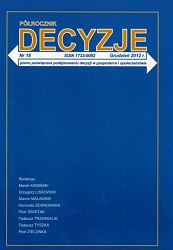
The goal of the present paper is to review recent theoretical models and empirical studies on the role of numeracy (i.e., cognitive ability in processing numerical information) in decision making under risk and uncertainty. The research conducted in the last decade points that numeracy is the most robust predictor of making good decisions, which predictions are independent of other psychological constructs or cognitive abilities (such as fluid intelligence or cognitive reflection). The pivotal role of numeracy has been described in at least three theoretical models: Fuzzy-Trace Theory, Skilled Decision Theory, and Multiple Numeric Competencies model. Furthermore, the results of numerous research indicate that better decisions made by people with high numeracy are underpinned by various psychological mechanisms of the cognitive, motivational, and affective nature. Findings related to the performance of people with high and low numeracy served to develop both immediate (e.g., visual aids or an experience-based format of risk communication) and long-term (e.g., cognitive training) methods of improving the decision-making process. Based on these decision aids, we can effectively support people with low numeracy in an accurate risk assessment, risk comprehension, and making better decisions.
More...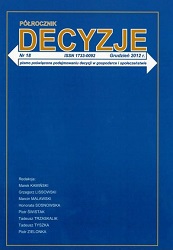
The main goal of this research was to investigate whether people exhibit algorithm aversion—a tendency to avoid using an imperfect algorithm even if it outperforms human judgments—in the case of estimating students’ percentile scores on a standardized math test. We also explored the relationships between numeracy and algorithm aversion and tested two interventions aimed at reducing algorithm aversion. In two studies, we asked participants to estimate the percentiles of 46 real 15-year-old Polish students on a standardized math test. Participants were offered the opportunity to compare their estimates with the forecasts of an algorithm—a statistical model that predicted real percentile scores based on five explanatory variables (i.e., gender, repeating a class, the number of pages read before the exam, the frequency of playing online games, socioeconomic status). Across two studies, we demonstrated that even though the predictions of the statistical model were closer to students’ percentile scores, participants were less likely to rely on the statistical model predictions in making forecasts. We also found that higher statistical numeracy was related to a higher reluctance to use the algorithm. In Study 2, we introduced two interventions to reduce algorithm aversion. Depending on the experimental condition, participants either received feedback on statistical model predictions or were provided with a detailed description of the statistical model. We found that people, especially those with higher statistical numeracy, avoided using the imperfect algorithm even though it outperformed human judgments. Interestingly, a simple intervention that explained how the statistical model works led to better performance in an estimation task.
More...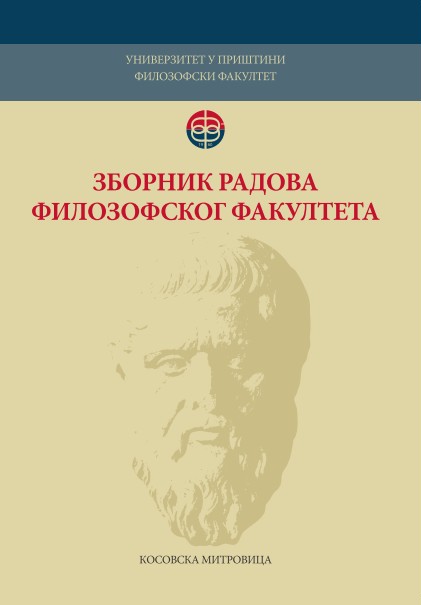
In this paper, the author considers the classical strategies of defense from Hume's argument against induction, and assesses the extent to which they were found to be successful. Synthetic, linguistic, a priori, pragmatic, and inductive strategies of defending induction are considered, as well as the question of the extent to which the justification of induction is a problem for grounding scientific knowledge. A new argument is introduced for the a priori justification of induction, as well as a critique of the synthetic and inductive defenses of induction by Black and Jacquette.
More...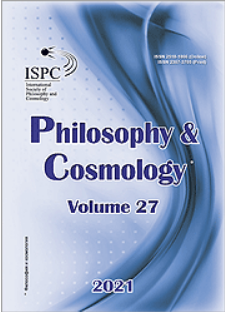
The Big Bang is the most accepted theory of how the Universe was born. However, this theory explains only the development of the Universe, not its origination. This paper develops two main ideas: a) that a strong philosophical approach encourages innovative thinking through the sharing of new scientific enlightenment, and b) the origination of “something” from “nothing” without violating the conservation laws. The second idea underlies our Universal Theory of Origination (UTO). The Universe has evolved on cosmological, physical, biological, psychological, and intellectual (human) levels. Our UTO explains how upper-level substances originate from lower-level substances. The origination of the physical level based on the origination of the biological level is described stepwise using a unitary law. We also provide a scope for understanding the origination of the biological, psychological, and intellectual levels. Our hypothesis is supported by a) well-known formal research and experiments, and b) an inference proof that nature behaves in a unitary way from one level to another. In the UTO, a fact can be displaced to another level by changing only the adjectives. A known aspect at one level can be interpreted on another level, giving rise to unknown truths. This work provides the basis of UTO, in turn resolving many open questions such as the origination of the physical world, space expansion, expansion acceleration, looking back in time, and the differences between galaxies.
More...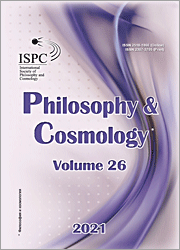
Since Einstein’s failure to define a Grand Unified Theory, physicists have pursued a comprehensive theory explaining nature, a Theory of Everything. But because General Relativity, Quantum Field Theory, and Cosmology have little in common, defining one theory is an imposing task, having eluded the best scientists for ninety years. So are we close to defining a Theory of Everything? This analysis, after defining requirements (which must include initial conditions), identifies four possible options for a Theory of Everything. Quotes from prominent physicists express divergent views on each alternative. The leading proposal for a Theory of Everything is String Theory, which has possible issues. It requires supersymmetry, has extra compacted dimensions, and is background-dependent. A second less comprehensive theory is Loop Quantum Gravity, which emphases background-independence based on discrete quantum space. Explaining how theories define relationships between spacetime, quantum space, quantum time, and quantum gravity, positions the role of background-independence in proposed theories. If supersymmetry and extra dimensions are discovered, String Theory or a modified String Theory integrated with Loop Quantum Gravity, may be the option. Or, possibly a radically new theory might be developed. Or, as the last option considers, the answer to the question — Does a Theory of Everything exist? — may be no; if so, nature will always be a mystery.
More...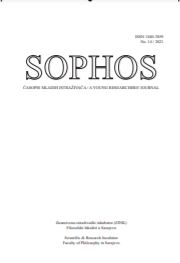
Ovaj rad nastoji da navede i dokaže teorem kompletnosti za sistem S5 od [1], dopunjen kvantifikatorima prvog reda i znakom jednakosti.
More...